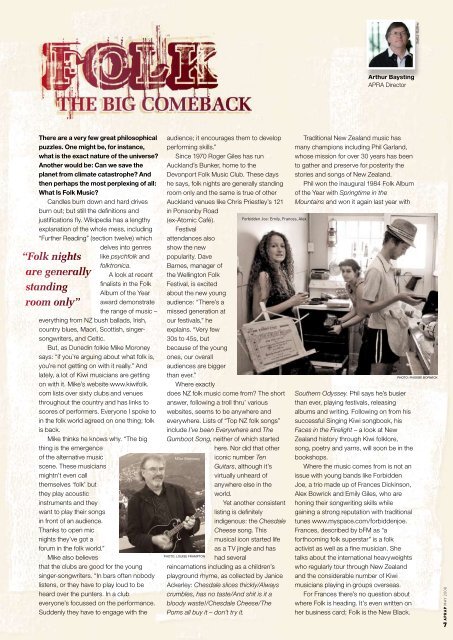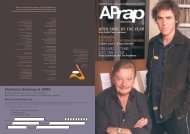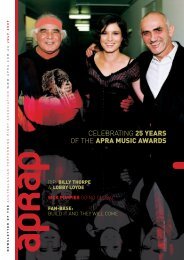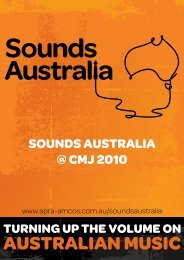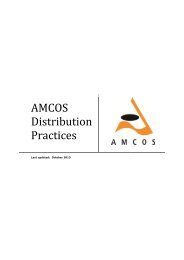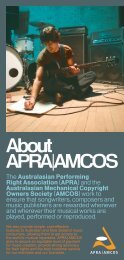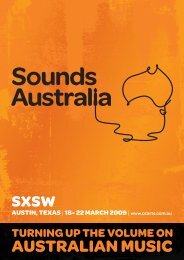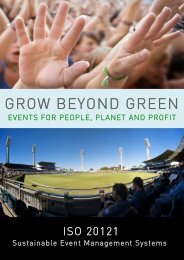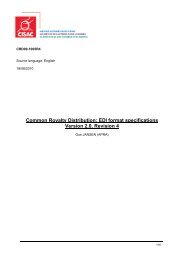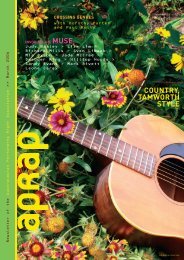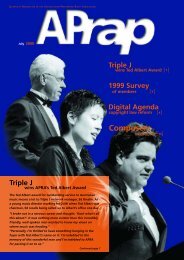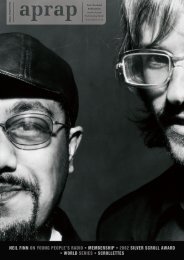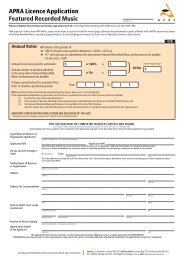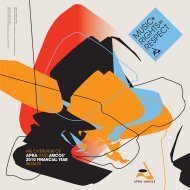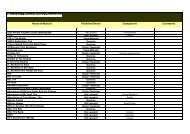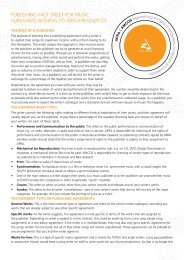online music com - APRA
online music com - APRA
online music com - APRA
You also want an ePaper? Increase the reach of your titles
YUMPU automatically turns print PDFs into web optimized ePapers that Google loves.
Arthur Baysting<br />
<strong>APRA</strong> Director<br />
There are a very few great philosophical<br />
puzzles. One might be, for instance,<br />
what is the exact nature of the universe?<br />
Another would be: Can we save the<br />
planet from climate catastrophe? And<br />
then perhaps the most perplexing of all:<br />
What Is Folk Music?<br />
Candles burn down and hard drives<br />
burn out; but still the definitions and<br />
justifications fly. Wikipedia has a lengthy<br />
explanation of the whole mess, including<br />
“Further Reading” (section twelve) which<br />
delves into genres<br />
like psychfolk and<br />
folktronica.<br />
A look at recent<br />
finalists in the Folk<br />
Album of the Year<br />
award demonstrate<br />
the range of <strong>music</strong> –<br />
everything from NZ bush ballads, Irish,<br />
country blues, Maori, Scottish, singersongwriters,<br />
and Celtic.<br />
But, as Dunedin folkie Mike Moroney<br />
says: “if you’re arguing about what folk is,<br />
you’re not getting on with it really.” And<br />
lately, a lot of Kiwi <strong>music</strong>ians are getting<br />
on with it. Mike’s website www.kiwifolk.<br />
<strong>com</strong> lists over sixty clubs and venues<br />
throughout the country and has links to<br />
scores of performers. Everyone I spoke to<br />
in the folk world agreed on one thing; folk<br />
is back.<br />
Mike thinks he knows why. “The big<br />
thing is the emergence<br />
of the alternative <strong>music</strong><br />
scene. These <strong>music</strong>ians<br />
mightn’t even call<br />
themselves ‘folk’ but<br />
they play acoustic<br />
instruments and they<br />
want to play their songs<br />
in front of an audience.<br />
Thanks to open mic<br />
nights they’ve got a<br />
forum in the folk world.”<br />
Mike also believes<br />
that the clubs are good for the young<br />
singer-songwriters. “In bars often nobody<br />
listens, or they have to play loud to be<br />
heard over the punters. In a club<br />
everyone’s focussed on the performance.<br />
Suddenly they have to engage with the<br />
audience; it encourages them to develop<br />
performing skills.”<br />
Since 1970 Roger Giles has run<br />
Auckland’s Bunker, home to the<br />
Devonport Folk Music Club. These days<br />
he says, folk nights are generally standing<br />
room only and the same is true of other<br />
Auckland venues like Chris Priestley’s 121<br />
in Ponsonby Road<br />
(ex-Atomic Café).<br />
Festival<br />
attendances also<br />
show the new<br />
popularity. Dave<br />
Barnes, manager of<br />
the Wellington Folk<br />
Festival, is excited<br />
about the new young<br />
audience: “There’s a<br />
missed generation at<br />
our festivals,” he<br />
explains. “Very few<br />
30s to 45s, but<br />
because of the young<br />
ones, our overall<br />
audiences are bigger<br />
than ever.”<br />
Where exactly<br />
does NZ folk <strong>music</strong> <strong>com</strong>e from? The short<br />
answer, following a troll thru’ various<br />
websites, seems to be anywhere and<br />
everywhere. Lists of “Top NZ folk songs”<br />
include I’ve been Everywhere and The<br />
Gumboot Song, neither of which started<br />
here. Nor did that other<br />
iconic number Ten<br />
Guitars, although it’s<br />
virtually unheard of<br />
anywhere else in the<br />
world.<br />
Yet another consistent<br />
listing is definitely<br />
indigenous: the Chesdale<br />
Cheese song. This<br />
<strong>music</strong>al icon started life<br />
as a TV jingle and has<br />
had several<br />
reincarnations including as a children’s<br />
playground rhyme, as collected by Janice<br />
Ackerley: Chesdale slices thickly/Always<br />
crumbles, has no taste/And shit is it a<br />
bloody waste!/Chesdale Cheese/The<br />
Poms all buy it – don’t try it.<br />
Traditional New Zealand <strong>music</strong> has<br />
many champions including Phil Garland,<br />
whose mission for over 30 years has been<br />
to gather and preserve for posterity the<br />
stories and songs of New Zealand.<br />
Phil won the inaugural 1984 Folk Album<br />
of the Year with Springtime in the<br />
Mountains and won it again last year with<br />
Southern Odyssey. Phil says he’s busier<br />
than ever, playing festivals, releasing<br />
albums and writing. Following on from his<br />
successful Singing Kiwi songbook, his<br />
Faces in the Firelight – a look at New<br />
Zealand history through Kiwi folklore,<br />
song, poetry and yarns, will soon be in the<br />
bookshops.<br />
Where the <strong>music</strong> <strong>com</strong>es from is not an<br />
issue with young bands like Forbidden<br />
Joe, a trio made up of Frances Dickinson,<br />
Alex Bowrick and Emily Giles, who are<br />
honing their songwriting skills while<br />
gaining a strong reputation with traditional<br />
tunes www.myspace.<strong>com</strong>/forbiddenjoe.<br />
Frances, described by bFM as “a<br />
forth<strong>com</strong>ing folk superstar” is a folk<br />
activist as well as a fine <strong>music</strong>ian. She<br />
talks about the international heavyweights<br />
who regularly tour through New Zealand<br />
and the considerable number of Kiwi<br />
<strong>music</strong>ians playing in groups overseas.<br />
For Frances there’s no question about<br />
where Folk is heading. It’s even written on<br />
her business card; Folk is the New Black.<br />
APR AP MAY 2008<br />
7


